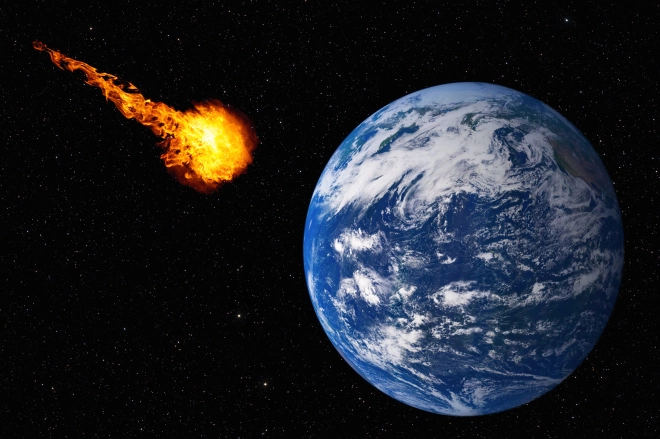A WHOPPING three asteroids will zip past Earth tomorrow ahead of the nerve-shredding pass of an Empire State Building-sized rock next week.
Source: The Sun
According to Nasa, the trio of objects are travelling up to 9000 miles per hour (14,400 kph) – though they’re expected to soar by at a safe distance.

The largest of the celestial passers-by, dubbed 2022 AG, is as long as commercial aeroplane, figures published on the space agency’s near-Earth object (NEO) tracker show.
That rock is expected to make its flyby at 6:30pm on January 14, while two smaller asteroids will make their close approaches a little earlier.
Objects 2022 AA4 and 2022 AF5 – which measure up to 28 and 16 metres long respectively – will soar past our planet at 1:48am and 4:46pm on Friday.
Thousands of NEOs are tracked by scientists to monitor whether they’re on a collision course with our planet.
Any fast-moving space object that comes within 4.65 million miles is considered to be “potentially hazardous” by cautious space organizations.
One small change to their trajectories could spell disaster for Earth.
Fortunately, none of the three asteroids coming our way on Friday are thought to pose any danger to us.
The closest of them will soar past at a distance of 867,000 miles from Earth – a little under four times the gap between our planet and the Moon.
Astronomers are more concerned about an asteroid more than twice the size of the Empire State Building that’ll whip past our planet next week.
Asteroid 7482 (1994 PC1) is estimated to be around 3,551 feet wide. Nasa is keeping a close eye on it ahead of its approach on January 18.
It’s been added to the space agency’s “Close Approaches” list, though is expected to fly safely past at a distance of more than a million miles.
Astronomers are currently tracking nearly 2,000 asteroids, comets and other objects that threaten our pale blue dot, and new ones are found every day.
Earth hasn’t seen an asteroid of apocalyptic scale since the space rock that wiped out the dinosaurs 66million years ago.
However, smaller objects capable of flattening an entire city crash into Earth every so often.
One a few hundred metres across devastated 800 square miles of forest near Tunguska in Siberia on June 30, 1908.
Fortunately, Nasa doesn’t believe any of the NEOs it keeps an eye on are on a collision course with our planet.
That could change in the coming months or years, however, as the space agency constantly revises objects’ predicted trajectories.
“Nasa knows of no asteroid or comet currently on a collision course with Earth, so the probability of a major collision is quite small,” Nasa says.
“In fact, as best as we can tell, no large object is likely to strike the Earth any time in the next several hundred years.”
Even if they were to hit our planet, the vast majority of asteroids would not wipe out life as we know it.
“Global catastrophes” are only triggered when objects larger than 900 metres smash into Earth, according to Nasa.Play VideoMeet the man with an observatory on a Welsh hilltop who tracks thousands of potentially apocalyptic asteroids for Nasa
In other news, personalised smart guns, which can be fired only by verified users, may finally become available to U.S. consumers this year.
Scientists are embarking on a mission to unravel the mystery behind dozens of grisly child mummies buried in an underground tomb in Sicily.
Police have caught an Italian mafia henchman who’d be on the run for 20 years after spotting the fugitive on Google Maps.
And, one of the best-preserved fossils ever found has confirmed that young dinosaurs burst from their shells just like baby birds.
Source: The Sun

































Leave a Comment
You must be logged in to post a comment.